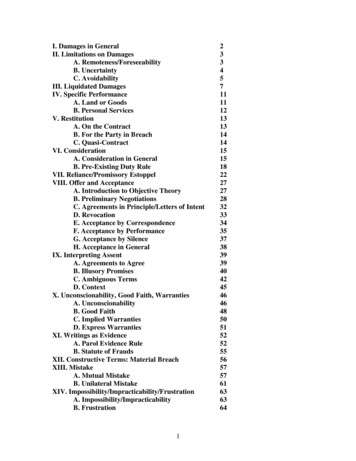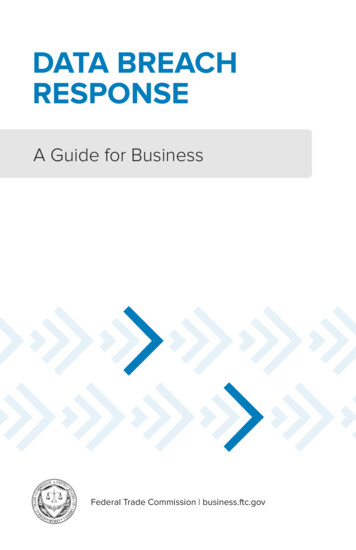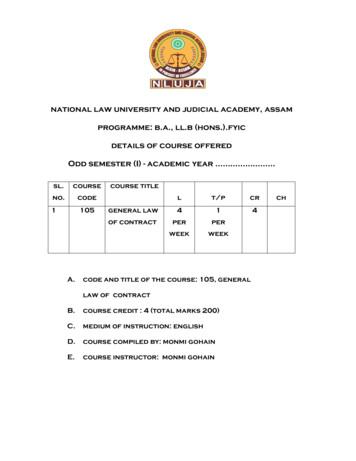
Transcription
I. Damages in GeneralII. Limitations on DamagesA. Remoteness/ForeseeabilityB. UncertaintyC. AvoidabilityIII. Liquidated DamagesIV. Specific PerformanceA. Land or GoodsB. Personal ServicesV. RestitutionA. On the ContractB. For the Party in BreachC. Quasi-ContractVI. ConsiderationA. Consideration in GeneralB. Pre-Existing Duty RuleVII. Reliance/Promissory EstoppelVIII. Offer and AcceptanceA. Introduction to Objective TheoryB. Preliminary NegotiationsC. Agreements in Principle/Letters of IntentD. RevocationE. Acceptance by CorrespondenceF. Acceptance by PerformanceG. Acceptance by SilenceH. Acceptance in GeneralIX. Interpreting AssentA. Agreements to AgreeB. Illusory PromisesC. Ambiguous TermsD. ContextX. Unconscionability, Good Faith, WarrantiesA. UnconscionabilityB. Good FaithC. Implied WarrantiesD. Express WarrantiesXI. Writings as EvidenceA. Parol Evidence RuleB. Statute of FraudsXII. Constructive Terms: Material BreachXIII. MistakeA. Mutual MistakeB. Unilateral MistakeXIV. Impossibility/Impracticability/FrustrationA. Impossibility/ImpracticabilityB. 343537383939404245464648505152525556575761636364
I. Damages for Breach of ContractThree ―Damage Interests‖ Expectation [Benefit of the Bargain]: Put promisee in position he would have been inhad the contract been performed: Measure: Wealth of promisee if promise had been performed – Actual Wealth Reliance (losses incurred due to expectation): Put promisee in the position he wouldhave been in had the contract never been made Restitution (e.g., down payment, deposit): Put the promisor back in the position hewould have been in had the promise never been madeSecond Restatement § 347: Measure of Damages in GeneralSubject to the limitations stated in §§ 350-53, the injured party has a right to damagesbased on his expectation interest as measured by(a) the loss in the value to him of the other party's performance caused by its failure ordeficiency, plus(b) any other loss, including incidental or consequential loss, caused by the breach, less(c) any cost or other loss that he has avoided by not having to perform. [Expectation]Hawkins v. McGee (The ―Hairy Hand‖ Case) (61) (NH 1929) Damages Value of ―perfect hand‖ (as promised) MINUS value of hand P ended up with In a proper case, P would also be entitled to lost profits or other positive harms doneTongish v. Thomas (79) (KS 1992)[Sale of seeds Tongish to Coop; Coop has re-sale contract with Bambino. Coop‘s profitswould have been handling fee. Tongish breached due to market price increase] True expectation damages would be lost profits (handling fee) [UCC §1-106] In this case, it is more efficient to award Market Price minus Contract Price This measure of damages encourages market efficiency and deters breach [UCC §2-713] Utility of the rule: Maintains the appropriate incentives to preserve the businessrelationship which these parties found to be efficientUCC §1-106: Remedies to be liberally administered so as to put Promisee in position hewould be in had the contract been performed (General Expectancy)UCC §2-712: Cost of substitution to Promisee minus Contract Price (―Cover‖)UCC §2-713: Market Price minus Contract Price, plus incidental damages (2-715)UCC §2-717: On notice to Promisor, Promisee may deduct damages caused by breachfrom any part of the price still due under the same contract2
II. Limitations on DamagesA. Remoteness/Foreseeability of HarmHadley v. Baxendale (86) (UK 1854)[P miller hires D shipping company to deliver a broken crankshaft for replacement] D promised P that crankshaft would be delivered in one day P‘s agent told D to hasten delivery, make special arrangements if necessary Some neglect on D‘s part caused delay in delivery Promisor is only liable for damages foreseen or which could have been reasonablyforeseen (by both parties) at the time when the agreement was made If ―special circumstances‖ are present, and are unknown to breaching party, that party isonly liable for amount of injury he could foresee to arise generally. Utility of the rule: Encourages high-value shippers to self-identify and contract aroundthe default rule of low-value damages. Separation of the pool (low-value versus highvalue shippers) is desirable to avoid one group subsidizing the other). Better for highvalue shippers to self-identify than low-value shippers, because there are less of them(less additional transaction costs) Hadley rule sometimes called the ―information-enforcing rule‖Second Restatement § 351: Unforeseeability and Related Limitations on Damages(1) Damages are not recoverable for loss that the party in breach did not have reason toforesee as a probable result of the breach when the contract was made.(2) Loss may be foreseeable as a probable result of a breach because it follows from thebreach(a) in the ordinary course of events, or(b) as a result of special circumstances, beyond the ordinary course of events, thatthe party in breach had reason to know.(3) A court may limit damages for foreseeable loss by excluding recovery for loss ofprofits, by allowing recovery only for loss incurred in reliance, or otherwise if itconcludes that in the circumstances justice so requires in order to avoid disproportionatecompensation.Morrow v. First National Bank of Hot Springs (102)(AK 1977)[Valuable coins stolen from house, failure of bank to notify that safety-deposit boxeswere available is alleged to be a breach of contract] No tacit agreement that the bank, for no consideration beyond standard rental fee of theboxes, would be liable for 32,000 if promised notice was not given. ‖Bare promise‖ to notify P about the availability of the box was not an implicitagreement to assume responsibility for P‘s property in the event the notice was not given.There is nothing to suggest that this was a liability that the bank agreed to, despite theforeseeability of the damages Uses different test than Hadley, but adheres to the underlying principle of limitedliability as the default—must contract around this if you want extra care with your highvalue package. Again, good default rule when you have many more low than high valueshippers and the transaction costs of contracting around the rule are significant.3
Note: Tacit Agreement Test is explicitly rejected by the UCC, and Arkansas is the onlystate to use it. Unusual damages are normally not compensable. They become compensable, however,when there is evidence that there was an agreement to deviate from the default rule(agreeing to make them compensable, whether that agreement was tacit or explicit)B. Uncertainty of HarmChicago Coliseum v. Dempsey (105) (IL 1932)[Dempsey agreed to prize fight with Coliseum company; later backed out of it Coliseum claimed 4 forms of damages: Lost Profits (not recoverable): No expectancy damages: Losses are too speculative Expenses prior to contract (not recoverable): Can‘t rely on a promise which hasn‘t yetbeen made (for exception, see Anglia) Expenses between contract and breach (recoverable): Reliance damages Expenses incurred to gain compliance (not recoverable). Could, inter alia, preventefficient breach, since a P could make it prohibitively expensive for a D to breach.Second Restatement of Contracts §346: Availability of Damages(1) The injured party has a right to damages for any breach by a party against whom thecontract is enforceable unless the claim for damages has been suspended or discharged.(2) If the breach caused no loss or if the amount of the loss is not proved under the rulesstated in this Chapter, a small sum fixed without regard to the amount of loss will beawarded as nominal damages.Second Restatement of Contracts §349: Damages Based on Reliance InterestAs an alternative to the measure of damages stated in § 347, the injured party has a rightto damages based on his reliance interest, including expenditures made in preparation forperformance or in performance, less any loss that the party in breach can prove withreasonable certainty the injured party would have suffered had the contract beenperformed.Second Restatement of Contracts §352: Uncertainty as a Limitation on DamagesDamages are not recoverable for loss beyond an amount that the evidence permits to beestablished with reasonable certainty.Anglia Television v. Reed (118) (UK 1971)[D (Mr. Brady), contracted to work on TV-movie in U.K., and later decided not to] Usually, a promisee can seek lost profits or wasted expenditures, but not both P did not claim lost profit, because it was too speculative (Expectation) P instead sought lost expenditures (Reliance) Expenditures made both before and after contract was formed are recoverable Court is striving for expectancy damages (the ideal), in a way awarding expectancydamages assuming that the deal under the contract would at least break even (goesbeyond pure reliance—which would only cover post-contract expenditures) (assumes thatpromisor reasonably knows that expenditures have been made and will be wasted)Mistletoe Express Service v. Locke (120) (TX 1988)4
[P enters into contract for delivery service, purchases vehicles and ramp in Reliance] P‘s business activity, however, was a losing enterprise Flipside of Dempsey: Breaching party can‘t claim that there would have been losses,since this is just as speculative as breachee claiming lost profits Reliance damages in the case of a losing contract. Burden on breacher to prove theamount of loss the breachee would have sustained had the contract been kept and have itsubtracted from breachee‘s reliance damages. Courts disagree as to whether to award pre-and post-contract expenditures (Anglia) orjust post-contact expenditure (Dempsey). BEA likes Anglia rule, as a presumption of profits equal to zero, and awardingexpectancy damages on that basis If party proves profit or loss would have resulted, the court will entertain such evidence.However, the default assumption is no profits/no loss The fact that the reliance rule (as applied in Anglia and Mistletoe, as well as theRestatement) allows a breacher to rebut the expenditures incurred by the breachee—byshowing that the expenditures would have been lost anyway—means that the standardbeing applied isn‘t truly reliance. If it were truly reliance, whether the expenditures would have been lost anywayshouldn‘t matter. The expenditures were made in reliance on the promise, therefore theyshould be recoverable. Therefore, the standard actually appears to be expectation with a rebuttable presumptionthat the losses/profits equal zero.C. Avoidability of Harm (Mitigation) Breachee who refuses to mitigate will not be able to recover full expectation damages.They can only recover expectation MINUS what would have been saved had theymitigated. This is the law‘s way of attempting to prevent waste Important to understand this concept vis-à-vis efficient breachHypothetical - Shipper brings perishables to a dock, leaves them there when carrier failsto show. Duty to mitigate means shipper must try and sell—call a different carrier, evena more expensive one (and recover the difference) rather than just letting the fish rot.Rockingham County v. Luten Bridge Co. (124) (4th Cir. 1929)[County hires Luten to construct bridge; County cancels contract; builder keeps working] Plaintiff (Contractor) cannot sue for damages that could have been avoided after breach. There is a duty to mitigate damages (ceasing to work) Expenditures after notification of repudiation (breach) will not be includedHypothetical #1 Contract to build a bridge for 100 (Cost to builder is 40 in each of two periods) County repudiates after first period; Bridge finished anyway Damages are 60 — 50 from the first period ( 40cost plus 10 profit) and 10 from thesecond period (just profit)5
Can also be described as Contract Price minus cost to finish the job Note: There must be an opportunity to mitigate (which is dealt with to some extent insome of the next few cases)Parker v. 20th Century Fox (128) (CA 1970)[P contracts to act in film; Movie not produced but studio offers her role in other film]When contract is for personal services, P not required to accept any position substantiallydifferent from, or inferior to, the one contracted for in order to mitigate damages. Not always clear whether or not work is inferior, forces courts to calculateimponderablesHypothetical #2 750k for the original movie—no net costs (harm or benefit done to career, etc.) 750k for the offered substitute) costs would net 250k (damage to career, unwillingnessto make movie, etc.) Damages would be 250k Fox would have paid 1m for Parker‘s work, rather than 750k for nothing, and wouldbe ahead by 500k as compared to cancellation of both movies No mitigation: 750k for no movies Mitigation: 1m for one movie (which nets 750k [benefit to society]) Loss with no mitigation: 750k Loss with mitigation: 1m- 750k 250k Waste prevented by mitigation: 500k The problem with this is that these amounts are too uncertainSecond Restatement of Contracts §350: Avoidability(1) Except as stated in Subsection (2), damages are not recoverable for loss that theinjured party could have avoided without undue risk, burden or humiliation.(2) The injured party is not precluded from recovery by the rule stated in Subsection (1)to the extent that he has made reasonable but unsuccessful efforts to avoid loss.Neri v. Retail Marine Corp. (140) (NY 1972)[Contract for the sale of boat—buyer breaches—Seller sells same boat to another buyer] Buyer says: Damages are NIL, because seller had to mitigate, and he did Seller says: Damages are lost profit; re-sale is not ―mitigation‖ because if contract wasnot breached, he would have sold two boats Holding: There was no obligation to mitigate, because there is no opportunity to mitigate The ―lost volume‖ doctrine applies because there is a theoretically limitless supply ofboats, i.e., it is correct that he would have sold two boats, and it is correct that there wasno opportunity to mitigate Seller is therefore entitled to lost profit on sale together with incidental damages Note: If the item were one-of-a-kind, and seller could or did sell to another buyer, thedamages would be zero, because the second sale was a substitution, not a supplement (asin the case of the two boats) Note: Must subtract one-time-only preparation costs for the boat6
Only thing Neri could have argued is that the only reason for the second sale was thefact that his boat was there, second buyer saw it, and wanted it The idea is that, but for the breach, the second sale would not have occurred (same logicas that used in the case of a unique item)Uniform Commercial Code§2-706 Seller‘s Resale — Statement of Neri rule(1) Seller should re-sell, then (subject to good faith) recover the difference between theresale price and the contract price incidental damages – expenses saved by breach(2) Resale may be at public or private sale, and may be as a unit or in parcels and at anyreasonable time and place and on any terms. Must be reasonably identified as referring tobroken contract, but goods don‘t have to exist or be identified to contract before breach.(3) If private sale, seller must give buyer reasonable notification of his intention to resell.(4) If public, (a) must be identified goods unless recognized market for public sale offutures, (b) must be at usual place for public sale if available (unless perishable or willdecline in value speedily—seller must give the buyer reasonable notice), (c) if goods arenot in view of those attending sale, must state where the goods are located and providefor reasonable inspection, (d) the seller may buy(5) A purchaser who buys in good faith at a resale takes the goods free of any rights ofthe original buyer even though the seller fails to comply with one or more of therequirements of this section.§2-708 Non-Acceptance or Repudiation — Expectancy(1) Measure of damages for non-acceptance or repudiation by the buyer is the differencebetween the market price at the time and place for tender and the unpaid contractprice incidental damages – expenses saved by breach (proof of market price §2-723)(2) If above damages are inadequate then the measure of damages is the profit (includingreasonable overhead) incidental damages due allowance for costs reasonably incurredand due credit for payments or proceeds of resale§2-710 Incidental DamagesIncidental damages to an aggrieved seller: commercially reasonable charges, expenses orcommissions incurred in stopping delivery, in the transportation, care/custody of goodsafter breach, return/resale costsIII. Liquidated DamagesUCC § 2-718 Liquidation of Damages — No penalty clause Liquidated damages must be reasonable (in the light of the anticipated or actual harm,the difficulties of proof of loss, and the inconvenience or nonfeasibility of otherwiseobtaining an adequate remedy) A term fixing unreasonably large liquidated damages is void as a penalty.(2) Where the seller justifiably withholds delivery of goods because of the buyer's breach,the buyer is entitled to restitution of any amount by which the sum of his paymentsexceeds(a) the amount to which the seller is entitled by virtue of terms liquidating the7
seller's damages in accordance with subsection (1), or(b) in the absence of such terms, twenty per cent of the value of the totalperformance for which the buyer is obligated under the contract or 500,whichever is smaller.(3) The buyer's right to restitution under subsection (2) is subject to offset to the extentthat the seller establishes(a) a right to recover damages under the provisions of this Article other thansubsection (1), and(b) the amount or value of any benefits received by the buyer directly orindirectly by reason of the contract.(4) Where a seller has received payment in goods their reasonable value or the proceedsof their resale shall be treated as payments for the purposes of subsection (2); but if theseller has notice of the buyer's breach before reselling goods received in partperformance, his resale is subject to the conditions laid down in this Article on resale byan aggrieved seller (Section 2-706). UCC (§2-719) States that an agreement can limit or alter recoverable damages Contractual remedy is optional unless expressly agreed to be exclusive If exclusive or limited remedy is determined to ―fail of its essential purpose,‖remedy may arise under UCC. Consequential damages can be limited or excluded, unless it is ―unconscionable‖ Limitation of conseq. Damages for injury to the person in the case of consumergoods is prima facie unconscionable, but not if the damages are commercial. To be enforceable, Liquidated Damages must be (1) Reasonable measure of estimateddamages [ex ante], and (2) Parties reasonably expect that calculation of actual damageswill be difficult [ex ante] Example of unenforceable LD clause, which meets requirement (1) but not (2): Farmer agrees to sell 1,000 hwt of seeds to buyer for 100/hwt 1,000 hwt is reasonable estimate of output; 100/hwt is reasonable estimate ofmarket price Farmer loses crop; fails to deliver At same time, price of seeds plummets (1) is satisfied; measure was reasonable (2) is NOT satisfied, since damage is:(a) nothing (since price plummeted)(b) easily calculated(c) a penalty Ex ante approach is the law (almost) whenever stated precisely, though ex post resultsoutside an expected range may provide evidence of ex ante unreasonableness (e.g.,Wassenaar) Reasonableness may be specific of the context of the breach (e.g., Kemble)8
When enforceable, LD logically precludes mitigation e.g.: Buyer puts 10k down payment on house, which is kept if he doesn‘t buy Buyer doesn‘t buy; seller keeps 10k Seller sells house later to another buyer for at least as much Seller, effectively, mitigated the loss Does buyer get 10k back? Under LD doctrine, no. 10k was reasonable estimate of damages at the time ofcontract, and there was no way to know what the damages would be at the time ofbreach (there is no buyer at the time of breach, and RE market fluctuates, so whoknows what the damages would be?) ex ante approach makes LD clausereasonable; not a penalty Mitigation doctrine doesn‘t apply because (1) Waste is not an issue in this case (2) Wedon‘t imagine that either party would allow waste to occur. No reason to think that LDclause was designed to negate mitigation Economic argument: Penalties discourage Efficient BreachCost of performance (breacher) is 2,000; value of performance to breachee is 1,000.LD are 3,000. Efficient breach says do not perform, pay 1,000.Under LD, breacher will perform (at cost of 2,000) rather than pay LD ( 3,000) Penalties discouraged because parties should only recover for the actual loss(es) suffered The above principle reflects one of two ideas about contractual enforcement which havelong been in tension: (1) Contractual institutions should aim to ensure that agreements areperformed, as opposed to (2) It is enough that the law provide compensation for the losssuffered by failure to perform. Might LD clauses, even Penalty clauses, be OK anyway? BEA says yes Competent grownups can decide for themselves Encourage performance (Market efficiency argument) Reduce litigation costs Encourage risk-averse parties to form contracts in the first place LD clauses can encourage proper levels of investment by contracting partiesKemble v. Farren (UK 1829)[Theater (P) sues actor (D) for LD: violation of engagement to perform for 4 seasons] Jury awarded less than the full LD amount (jury instructed to award actual damages) Contract assesses LD too broadly (any violation, even a remote/minute damages) If a large sum is to be paid for failure to pay a small sum, damages seem to be penal P says LD only for uncertain losses; certain losses for jury—but contract doesn‘t specify These are not LD, even though the contract characterizes them as such; they are penalWassenaar v. Towne Hotel (WI 1983)[P is former hotel employee, suing hotel (D) for LD set in his contract] TC: Contract stipulated full salary for unexpired term in case of ―wrongful discharge‖ AC reversed; Damages unenforceable—Penal9
Damages from breach easily calculated and proven; Fixing damages at full salarywithout considering how long it would take to find a new job is unreasonable SC: Stipulated Damages are Enforceable When breacher challenges stipulated damages, it is his burden of proof to show why itshould not be enforced Court employs reasonableness standard, balancing 2 approaches to stipulated damages:(1) Stipulated (Liquidated) Damages clauses are good.a. Allow control of risk exposure, setting payment for breach in advanceb. Correct perceived judicial inadequacies(uncertainty/remoteness)c. Promote judicial economy and freedom of contract(2) Stipulated damages are disfavored.a. Public law, not private agreement, ordinarily defines remediesb. Private remedy can‘t go far from principle of compensatory damagesc. Stipulated damages substantially in excess unenforceable as penal Reasonableness test strikes a balance by respecting bargain but preventing abuse Normally damages would be salary employee would have received expenses ofsecuring other employment – income which employee earned, will earn or could (withreasonable diligence) earn during the unexpired term LD can also factor in normally non-recoverable damages (injury to professionalreputation, loss of career development opportunities, emotional stress) Absent contrary evidence, courts can consider reasonableness of damages amount inlight of these other possible consequential damages, in connection with LD clause In this case, there is no evidence in the record about employee‘s subsequent earnings Earnings after breach may be relevant, but once court determines that stip. damageswere reasonable, there is no need to determine actual damages.Restatement (Second) of Contracts, §355: Punitive Damages Punitive damages are not recoverable for breach of contract unless conduct constitutingthe breach is also a tort for which punitive damages are recoverable§356, Liquidated Damages and Penalties Liquidated damages can be agreed upon as long as the amount is reasonable in light ofanticipated or actual loss caused by breach, and difficulty of proving such a loss. Unreasonably large liquidated damages are unenforceable, on grounds of public policy,as a penalty Term in bond providing for money as penalty for non-occurrence of condition of bond[i.e., the old way of doing it] is unenforceable to the extent that the amount exceedsactual loss caused by breachLake River Corp. v. Carborundum Co. (7th Cir. 1985) Court wonders whether it is wise to refuse to enforce penalty clauses, when agreed to bya ―substantial corporation‖ who is able to ―avoid improvident commitments‖ Court recognizes that penalties increase risk to other creditors, risk of bankruptcy, butthese are not so compelling, because we don‘t typically try to prevent businesses fromassuming risks Compelling argument against penal damages is that they may deter efficient breach10
Since compensatory damages should be sufficient to deter inefficient breach, penaldamages are unnecessary, and would only serve to deter some efficient breaches However, this argument overlooks the possibility that agreeing to penalty clause maymake contractor more credible, and ―may therefore be essential to inducing some valuemaximizing profits to be made‖ Assuming parties are rational, they will weigh the benefits of the penalty clause againstthe possible costs (including the fact that it may deter efficient breach), and will onlyinclude penalties if its benefits exceed those costs (and other costs which would beconsidered) Court thinks the refusal to enforce penalty clauses is ―(at best) paternalistic,‖ whichseems especially odd when it‘s parental concern for large corporations Courts should probably be more deferential to contracting parties Still, the court is enforcing Illinois law, and Illinois doesn‘t like penal damages Per Illinois, liquidated damages must be a reasonable estimate at the time of contract ofdamages likely to result from the breach (considering also difficulty of measuring actualdamages after breach occurs) If the damages would be easy to determine at the time of contract, or if stipulateddamages greatly exceed reasonable upper estimate of damages, they are penal, andinvalid.IV. Specific Performance and InjunctionsA. Land or Goods Alternative to expectancy damages—exception, rather than the rule An extreme form of liquidated damages, making breach impossible Replevin: Get the actual item back With unique goods, make party whole w/o idiosyncratic attempt to determine worth Most common with unique goods, difficult-to-replace items, and land Sometimes also used when expectancy damages wouldn‘t be fully compensatoryLANDLoveless v. Diehl (184) (AK 1963)[Purchase and resale of land, similar to Tongish, originally Diehl v. Loveless] Question about whether or not property had appreciated in value Court believed Diehl‘s claim that it had, since Loveless was contesting the sale Specific performance usually appropriate in sale of landGOODSCumbest v. Harris (189) (MS 1978)[P sold stereo to D with buyback option (essentially a loan with the stereo as collateral).D refused to re-sell. P sued for specific performance] Sentimental item, and many parts are difficult to replace Sufficiently unique to justify specific performance Note: This actually a security case (collateral), should be handled under UCC Article 9Scholl v. Hartzell (192) (PA 1981)11
[P contracted to buy D‘s corvette, and D backed out. P sought specific performance] Corvette not sufficiently unique to merit specific performance, damages sufficientSedmak v. Charlie’s Chevrolet (194) (MO App 1981)[P contracted to buy D‘s limited edition commemorative Corvette pace car] Unique item. Specific performance is appropriateWhere do we draw the line? Why specific performance? Expectancy damages sometimes fail to account for subjective valuation of unique goods If there‘s a market for the provision of goods or services, subjective valuation irrelevant Unique plot of land—no ―market‖ Question courts ask is: How easy/hard will it be to price a similar item? Even if rare, if something‘s traded regularly, objective value may be ascertainable No bright line to determine how much trading/market activity, however Market value also only says how much next highest bidder would pay, which may beinsufficient in cases of unique goods with subjective value Efficient breach usually not an issue, since the ―thing‖ exists and performance giving it Maybe if Tom Seaver moved next door and I was gonna sell you my house—I like him,you don‘t—this could make breach efficient, but unlikelyUCC § 2-716: Buyer's Right to Specific Performance or Replevin(1) Specific performance may be decreed where the goods are unique or in other propercircumstances.(2) The decree for specific performance may include such terms and conditions as topayment of the price, damages, or other relief as the court may deem just.(3) The buyer has a right of replevin for goods identified to the contract if afterreasonable effort he is unable to effect cover for such goods or the circumstancesreasonably indicate that such effort will be unavailing or if the goods have been shippedunder reservation and satisfaction of the security interest in them has been made ortenderedB. Personal ServicesLumley v. Wagner (203) (UK 1852)[Opera singer to perform at a specific opera house] Court can‘t demand specific performance to make her sing It can, however, enjoin her from singing elsewhere if she has agreed to such a negativestipulation Injunction can only last for a reasonable period of timeFord v. Jermon (207) (DC Philly 1865)[Same facts but in the U-S-of-A] Lumley was bad—amounts to ―compelling obedience by imprisonment‖ ‖Mitigated form of slavery‖ If specific perfo
A. Agreements to Agree 39 B. Illusory Promises 40 C. Ambiguous Terms 42 D. Context 45 X. Unconscionability, Good Faith, Warranties 46 A. Unconscionability 46 B. Good Faith 48 C. Implied Warranties 50 D. Express Warranties 51 XI. Writings as Evidence 52 .











